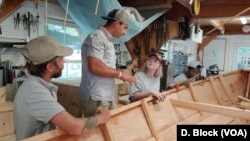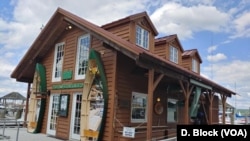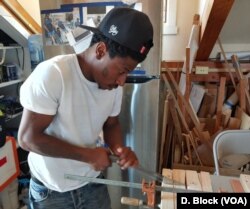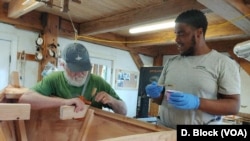“I have to keep the pressure slow and steady, so I don’t mess this up,” said Tykeece Simms, cutting some boards for a doghouse.
Simms is learning woodworking skills as an apprentice in the Alexandria Seaport Foundation’s wooden boatbuilding program in Alexandria. Small groups of apprentices learn the craft at the group’s seaport center, a floating timber chalet on the banks of the Potomac River.
Located outside Washington, the program is designed to help at-risk young adults from 17 to 23 years old gain the skills, confidence and discipline to change their lives for the better.
“The lack of self-esteem and negative self-talk are big problems,” said Victoria Davis, who teaches the apprentices life skills, “so we work on improving their self-image.”
Joining the year-round program was a no-brainer for Simms.
“I kept getting into trouble, and the last time, I was given the choice of going to jail again or going into the apprenticeship program,” he told VOA.
Simms is hopeful his life will turn around.
“Everybody is nice and helping me to become a better person,” he said. “You work but also laugh and have a great time.”
The apprentices are paid during their stay, which averages between six and nine months. If they are homeless, the foundation helps to find them a place to stay.
Many, including Simms, have not graduated from high school. During the program, they study to earn their GED certificate — a high school equivalency credential.
“They face a lot of challenges,” said Gabe Beckerman, who is at the helm of the program as an apprentice program instructor. “Many of them have serious family problems. They may have been stealing things, had drug and alcohol addictions, and are finding it difficult to deal with their emotions.”
Simms said the instructors help in many ways.
“They teach you how to try to control your anger and help you from being depressed,” he said. “They also talk to you about believing in yourself, even though other people have let you down.”
Chris Cease, the other apprentice program instructor, said he understands their struggles.
“I became an apprentice a few years ago when I was 19,” he said. “I was breaking into buildings and getting into fights. The program helped straighten me out and learn how to be an adult.”
Cease helps the apprentices reach their goals.
“I treat them like brothers and sisters and do whatever I can to help them,” he told VOA. “A lot of them don’t have anyone, and I show them that they are not alone.”
For Deion Smalls, 22, who grew up with drug-addicted parents in a poor Washington neighborhood, that means everything.
Smalls arrives early at the center each day.
“Coming here is like a healthy drug and a breath of fresh air,” Smalls said enthusiastically.
“I thought I was nothing before I came here, but everyone showed me I am somebody. I love it here,” he added as he began working on a wooden boat.
Beckerman said building a small boat is just a vehicle to help the apprentices with deeper issues.
“It's about learning about themselves, and woodworking helps pass the time,” he said.
Jay Creech, a longtime volunteer who teaches the young people how to build the boats, said they get a lot from the experience.
“We give them the tools to make things they’ve never done before and the confidence and satisfaction of accomplishing something,” he said.
Apprentice Zaria Eubanks said the program has helped her to grow.
“It’s way more than about working on the boats or doing little projects,” she said. “It’s also about expressing your opinion, knowing you will not be judged, and not being afraid of what others might think of you.”
Rob Dutton, another boatbuilding volunteer, said, “You're providing sort of mini-therapy sessions with these young people as you talk to them about themselves as they work on a project. You build trust and security and teach them pride.”
Madison Hoffa, 18, who just joined the program, craves that security. She said she’s been on her own since she was 14 after her mother was put in prison for selling drugs.
“I want to feel safe and comfortable and not worry about if I’m going to eat tomorrow,” she said.
Cease said while most of the apprentices complete the program, 30% do not. “Some find it difficult to adjust to the structure,” he said.
However, Smalls and Eubanks said they are sticking with it.
“I’m going to use my troubles to make myself successful and start a landscaping business,” Smalls said.
Eubanks agreed.
“I am proud of myself, and once I complete my GED, I hope to continue my education by going to college,” she said.







